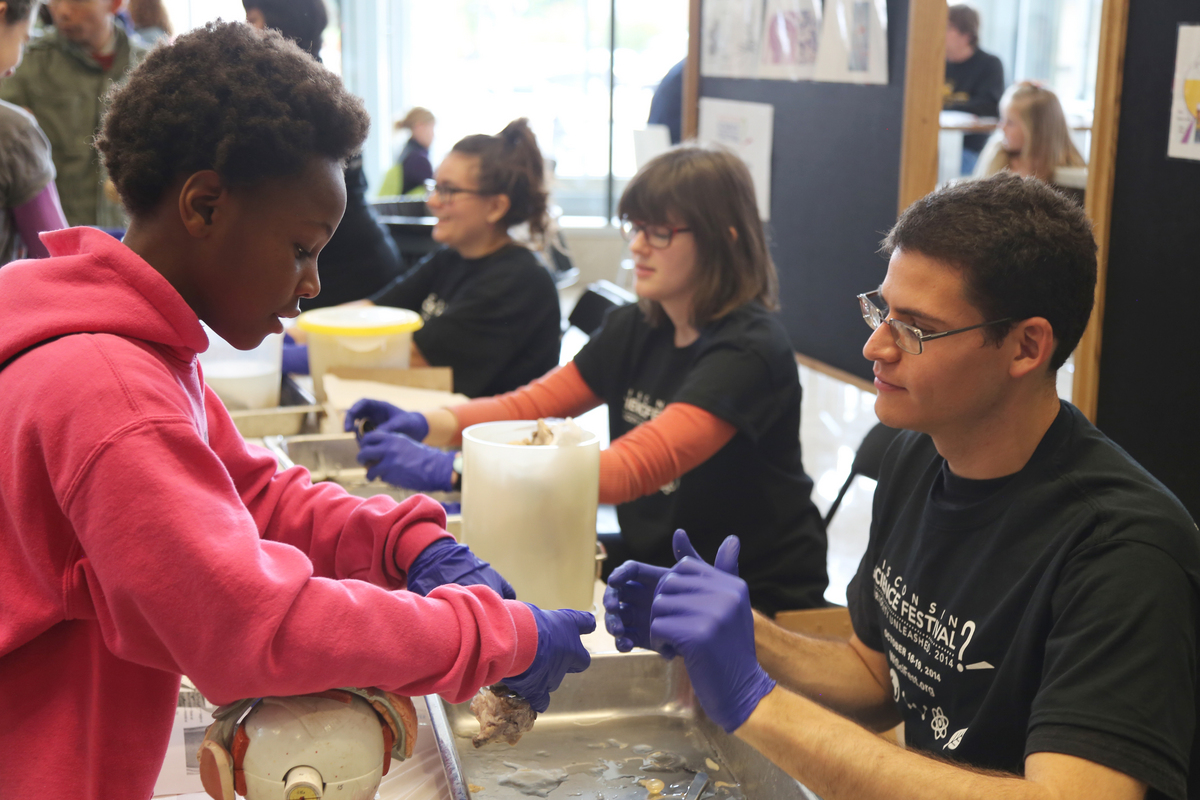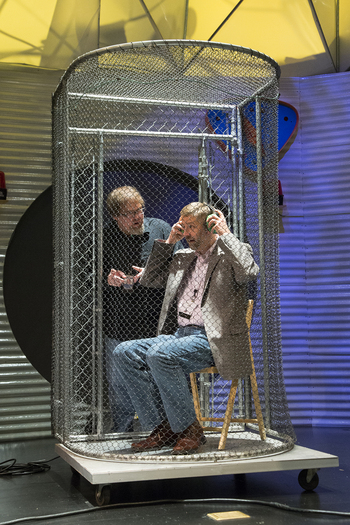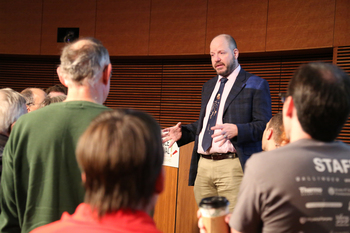Wisconsin Science Festival embraces ‘Made in Wisconsin’ theme

A volunteer and a visitor examine the structure of an eyeball at the 2014 Wisconsin Science Festival’s Discovery Expo, a hands-on, family-friendly event that takes place in the Discovery Building over all four days of the festival.
Photos courtesy of Wisconsin Alumni Research Foundation
A robot zoo, carbonated fruit and virtual reality simulations are just a handful of the experiences to be had at the 2015 Wisconsin Science Festival, held this year from Oct. 22 to 25.
Now in its fifth year, the festival continues to grow, with more than 30 communities hosting activities statewide — from Ashland to Madison to the festival’s featured partner at the University of Wisconsin-Milwaukee.
“If you’re interested in sports, cooking, new technology, current events — you’re consuming science whether you’re aware of it or not.”
Laura Heisler
Laura Heisler, director of the festival and programming for the Wisconsin Alumni Research Foundation and the Morgridge Institute for Research, says the event has something for everyone and appeals to all ages and interests.
“If you’re interested in sports, cooking, new technology, current events — you’re consuming science whether you’re aware of it or not,” says Heisler. “They all have science at their core.”
This year’s hallmark event is “Made in Wisconsin,” a Friday night feature showcasing both established Wisconsin traditions and emerging entrepreneurial endeavors. Visitors will experience Wisconsin’s growing maker culture through hands-on demonstrations, samples of Wisconsin fare, and eight-minute flash talks from companies like Thermo Fisher Scientific, the festival’s presenting sponsor.

Discovery World in Milwaukee hosts several Wisconsin Science Festival events each year that engage participants in hands-on activities. Milwaukee is one of more than 30 cities that host events over the four-day festival.
“The festival is always a rich environment for both professionals and enthusiasts to discuss scientific issues of the day and discoveries happening in our state and around the world,” says Kate VandenBosch, dean of the College of Agricultural and Life Sciences (CALS) and chair of the festival’s planning committee. “This year’s ‘Made in Wisconsin’ theme offers a special opportunity to explore the science behind many Wisconsin products. It is truly a celebration of Wisconsin ideas and the innovations that grow from those ideas.”
The evening culminates with a talk on the art and science of video games from Raven Software, a company located in Middleton that produces many blockbuster games.
“Art can illuminate how we see the world of science,” says Norma Saldivar, executive director of the UW–Madison Arts Institute, which works closely with the company. “We’re excited to bring Raven Software as guests because they also have great interest in seeing the two worlds come together and are a beautiful example of how art and science intersect.”
“Art can illuminate how we see the world of science.”
Norma Saldivar
In addition to building more statewide festival activities for all ages, the Madison campus community is expanding local efforts in the four-day event. For example, the UW–Madison International Division is hosting a series of flash talks by scientists working on some of the world’s most pressing problems, while the Department of Life Sciences Communication is tackling discussions around controversial science topics like gene editing.
“The science activities geared toward the kids are always a hit,” says Heisler, “but we also want to engage the community in those controversial science discussions that are at the forefront of current events.”

John Hawks, UW–Madison anthropology professor, answers questions at the 2014 festival after a presentation on the Rising Star Expedition, which led to the discovery of the early human relative Homo naledi. Hawks will participate in several 2015 festival events.
Many activities will be held in the Town Center of the Discovery Building, 330 N. Orchard St., with other events taking place elsewhere in Madison and in many communities statewide.
Highlighted events include:
Big Ideas, Busy People
Thursday, Oct. 22, 7-9 p.m. in the Discovery Building
Back by popular demand, UW–Madison and UW-Milwaukee faculty in areas ranging from anthropology to mathematics will highlight their groundbreaking work in talks limited to five minutes. An additional five-minute Q and A will follow each presentation.
Featured speakers include John Hawks, professor of anthropology; Jordan Ellenberg, professor of mathematics; Kathy Cramer, professor of political science; Eric Wilcots, professor of astronomy; Andreas Velten, research affiliate at the Morgridge Institute; Kevin Ponto, assistant professor of design studies; Bilge Mutlu, associate professor of computer science; Sunduz Keles, professor of biostatistics; and Janis Eells, professor of biomedical sciences.
Made in Wisconsin
Friday, Oct. 23, 5:30-8 p.m. in the Discovery Building
At this expo-style event designed for adults, meet the people who make Wisconsin products, from startup businesses to internationally known companies. From tools, toys and microscopes to cheese, beer and salsa, you might be surprised to learn about everything that is “Made in Wisconsin.” Additional artisanal food tastings will be available for purchase through advance ticket sales, though attendance and other samples are free to the public.
Designer genes: Should we be able to edit our genomes?
Saturday, Oct. 24, 1:15-2:45 p.m. in the Discovery Building
Genome editing using the CRISPR-Cas9 technique presents both tremendous opportunities and ethical challenges. At this interactive roundtable, policy analysts, sociologists and genomics researchers discuss what’s at stake.
Science Café: Red all over: What’s in a color?
Saturday, Oct. 24, 6-7 p.m. in the Discovery Building.
When it comes to the color red, it can mean everything from Badger pride to fire engine alarms. Feast on an all-red menu by Steenbock’s on Orchard and join the discussion led by consumer science professor Dee Warmath, featuring Jude Stewart, author of ROY G BIV: An Exceedingly Surprising Book About Color; atmospheric science professor and “Weather Guy” Steve Ackerman; and artist and design studies professor Jennifer Angus.
Check the Wisconsin Science Festival website for more detailed information about the full festival schedule for Madison and statewide events. Entry to most festival events will be free, though some activities may require nominal fees for materials. Some community partner sites may charge their usual admission fees.
—Courtni Kopietz
Subscribe to Wisconsin Ideas
Want more stories of the Wisconsin Idea in action? Sign-up for our monthly e-newsletter highlighting how Badgers are taking their education and research beyond the boundaries of the classroom to improve lives.
Tags: The Wisconsin Idea



